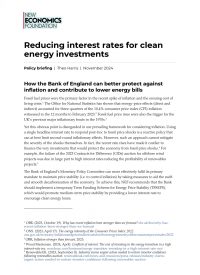Publications Reducing interest rates for clean energy investments How the Bank of England can better protect against inflation and contribute to lower energy bills By Theo Harris 02 December 2024 Download the report Fossil fuel prices were the primary factor in the recent spike of inflation and the ensuing cost of living crisis. The Office for National Statistics has shown that energy-price effects (direct and indirect) accounted for three-quarters of the 10.4% consumer price index
Topics:
New Economics Foundation considers the following as important:
This could be interesting, too:
Robert Vienneau writes Austrian Capital Theory And Triple-Switching In The Corn-Tractor Model
Mike Norman writes The Accursed Tariffs — NeilW
Mike Norman writes IRS has agreed to share migrants’ tax information with ICE
Mike Norman writes Trump’s “Liberation Day”: Another PR Gag, or Global Reorientation Turning Point? — Simplicius
Reducing interest rates for clean energy investments
How the Bank of England can better protect against inflation and contribute to lower energy bills
02 December 2024
Fossil fuel prices were the primary factor in the recent spike of inflation and the ensuing cost of living crisis. The Office for National Statistics has shown that energy-price effects (direct and indirect) accounted for three-quarters of the 10.4% consumer price index (CPI) inflation witnessed in the 12 months to February 2023. Fossil fuel price rises were also the trigger for the UK’s previous major inflationary bouts in the 1970s.
Yet this obvious point is disregarded in our prevailing framework for considering inflation. Using a single headline interest rate to respond post-hoc to fossil price shocks is a reactive policy that can at best limit second-round inflationary effects. However, such an approach cannot mitigate the severity of the shocks themselves. In fact, the recent rate rises have made it costlier to finance the very investments that would protect the economy from fossil price shocks. For example, the failure of the 2023 Contracts for Difference (CfDs) auction for offshore wind projects was due in large part to high interest rates reducing the profitability of renewables projects.
The Bank of England’s Monetary Policy Committee can more effectively fulfil its primary mandate to maintain price stability (i.e. to control inflation) by taking measures to aid the swift and smooth decarbonisation of the economy. To achieve this, NEF recommends that the Bank should implement a temporary Term Funding Scheme for Energy Price Stability (TFSEPS), which would promote medium-term price stability by providing a lower interest rate to encourage clean energy loans.
Via the TFSEPS, the Bank would offer commercial banks long-term loans, at a rate below Bank rate, to refinance their lending towards clean energy projects and buildings retrofits. This would increase clean energy supply and reduce the demand for fossil fuels, insulating the economy from fossil fuel price shocks and smoothing energy price fluctuations.
The scheme would also result in a reduction in electricity bills. The government’s clean power mission requires unprecedented levels of capital investment in the power system over the next five years. Included in this, up to 55GW of renewables capacity might be secured via CfDs which effectively lock in electricity prices for 15 years. Therefore, this is a crucial period for ensuring low energy bills far into the future. NEF estimates suggest that a 2.5% decrease in interest rates for renewables and grid upgrades in the years 2026 – 30 could result in £29bn of savings in system-wide electricity costs from 2026 – 45, or £24 per household per year (in 2024 prices).
Image: iStock




